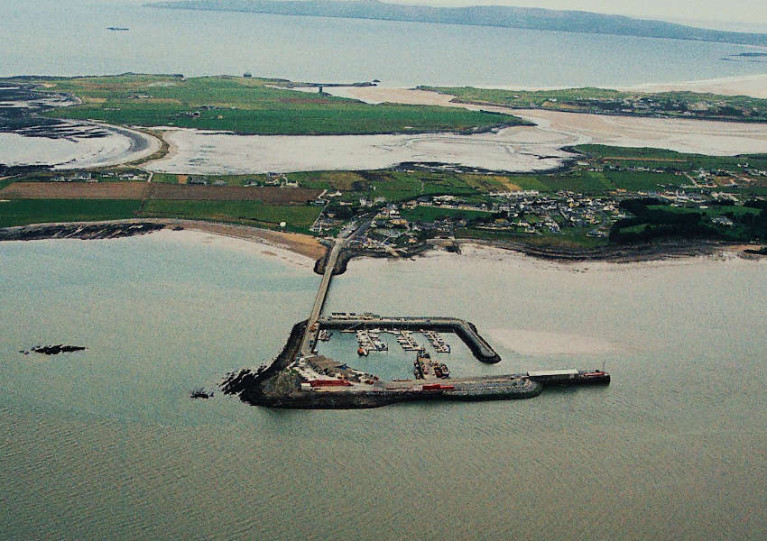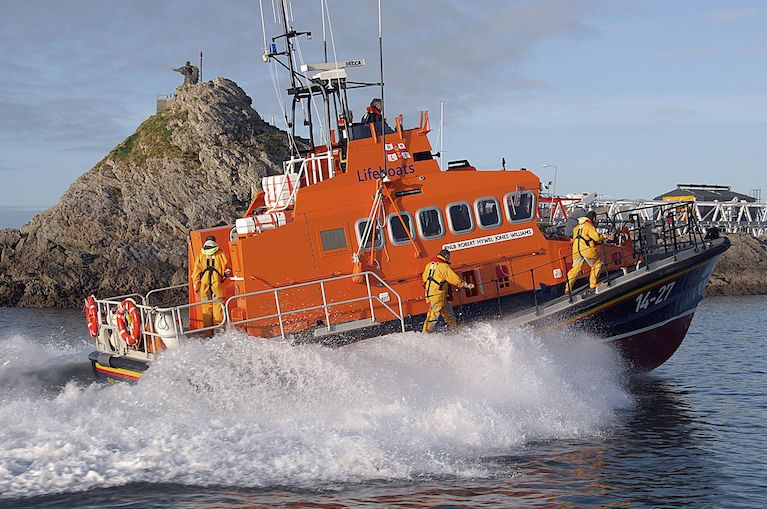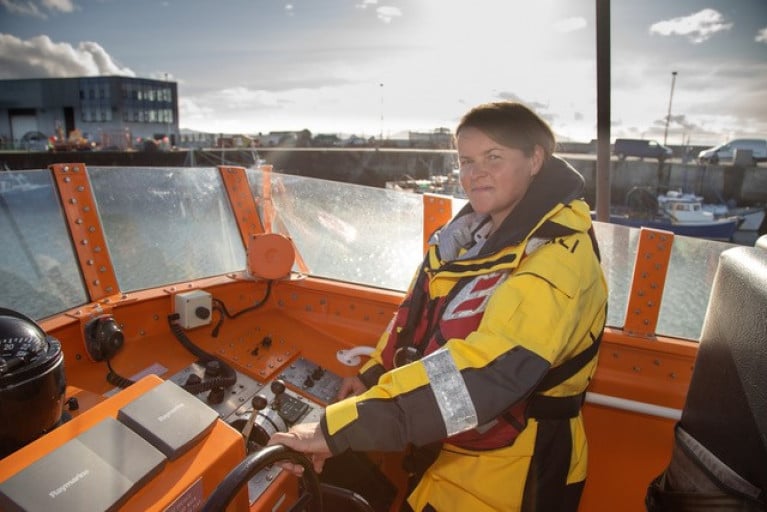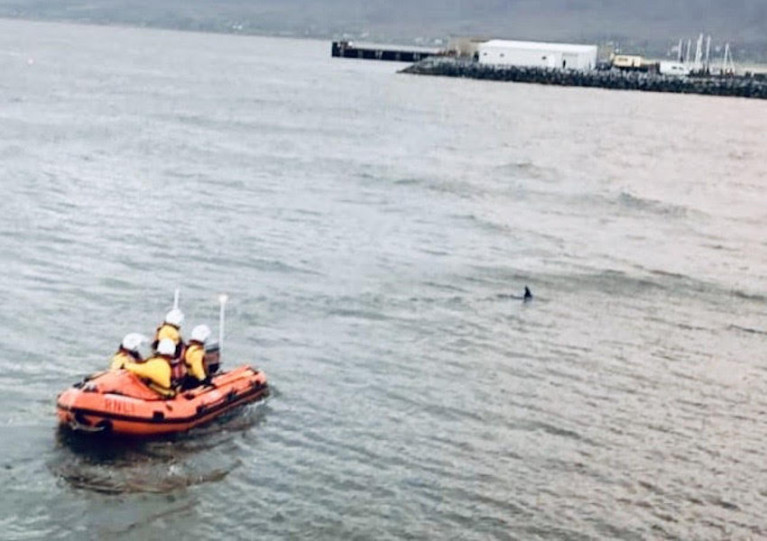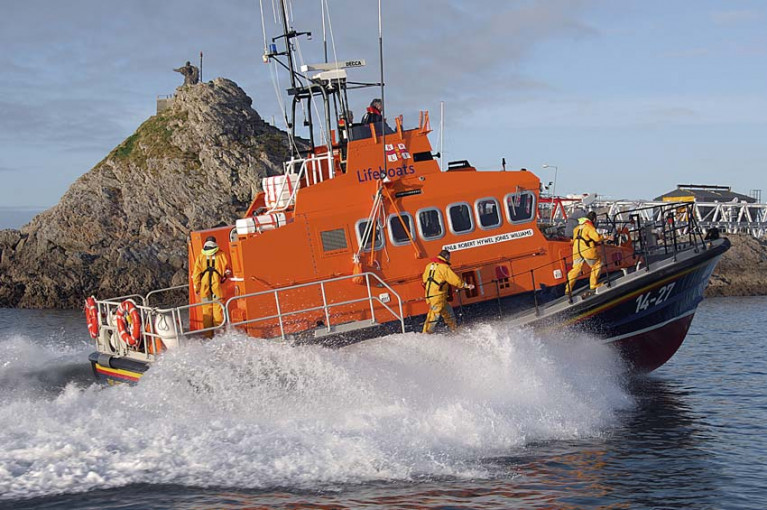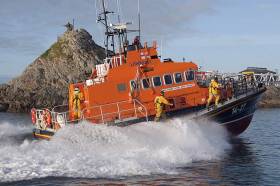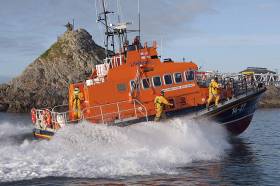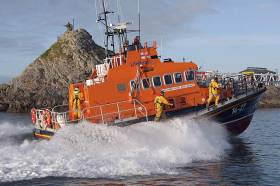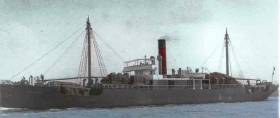Displaying items by tag: Fenit
Open-Air Diving to Return in Fenit After Near 20-Year Gap
Open-air diving is set to return to Fenit in Co Kerry after a near 20-year gap, as RTÉ News reports.
The move follows a three-year campaign to revive a long history of diving at the harbour town just outside of Tralee.
The tradition ceased in Fenit nearly 20 years ago after a claim against the former Tralee swimming club, and diving at the town remained closed amid health and safety concerns.
But local campaigners recently set up a restoration committee with a focus on the tourism potential of diving boards in the harbour as part of the Wild Atlantic Way.
Following appeal, plans for a 3.5m diving board on the Fenit Bathing Slips have now been given the green light — with fundraising now the only obstacle.
RTÉ News has more on the story HERE.
The team at Fenit RNLI in County Kerry is calling for new volunteers to help them to save lives at sea.
The charity is looking for volunteers to take up the Deputy Launching Authority role at the station. This role will authorise the launch of the station’s all-weather and inshore lifeboats, provide leadership in the absence of the Lifeboat Operations Manager and oversee that all operational activities are carried out to ensure the lifeboats and all associated equipment are maintained in readiness for launching on service.
Fenit RNLI is seeking team players with leadership skills and local maritime knowledge. The role is best suited to those who live within good proximity of the lifeboat station.
The call-out follows Fenit's welcome of the first female appointment of a Lifeboat Coxswain in Ireland in September.
Fenit RNLI which re-opened in 1994, after a gap of 25 years, and today operates both an all-weather Trent class lifeboat and an inshore D class lifeboat, launched its lifeboats 27 times last year bringing 28 people to safety.
Ger O’Donnell, Fenit RNLI Lifeboat Operations Manager is now calling on new volunteers to find out more: ‘Volunteering with us gives people the opportunity to make a real difference in their local community, to save lives and become part of the larger RNLI family. We can’t keep people safe without the support of our wonderful volunteers, who truly make a difference every day no matter which role they are fulfilling.
‘Becoming a volunteer Deputy Launching Authority is a great chance to play a crucial part in helping to save lives. We are looking for enthusiastic people who are willing to offer some of their free time to join what I believe to be, one of the most rewarding voluntary services that is out there. Every volunteer receives first-class training from the RNLI and learns new skills which can benefit them in many walks of life. Full training will be supplied to ensure Deputy Launching Authorities can authorise the launch of our lifeboats, provide the necessary leadership for our volunteer crew and ensure that all operational activities are carried out to maintain the lifeboats and equipment for launching on a call out.’
Anyone interested in finding out more or wants to apply is asked to email Rob King, Area Lifesaving Manager at [email protected] or Fenit RNLI at [email protected]
Fenit RNLI Welcomes First Female Lifeboat Coxswain in Ireland
Denise Lynch, a volunteer lifeboat crewmember with Fenit RNLI in Kerry, has been passed out as an RNLI Coxswain. She is currently the only woman to hold the senior position on an operational lifeboat crew in Ireland and is the first woman to be appointed to the role in the country. Denise began as a volunteer in 2001 and has served on both Fenit RNLI’s inshore and all-weather lifeboats.
Denise became interested in lifeboats as a primary school student when her class visited the lifeboat station on a school trip. From a prominent fishing family in Fenit, as a child, she knew and looked up to the lifeboat Coxswain and decided that when she was old enough she would join the lifeboat crew. The middle of six children, Denise (37) is the only one of her family to serve on the lifeboat.
On her appointment, Denise said, ‘From the day I visited the station in primary school, I fell in love with lifeboats. I know my family and the lifeboat crew are proud of me and I feel incredibly honoured and ready for this new challenge. I have been a Helm on the inshore lifeboat and a navigator on the all-weather lifeboat for years. I think about how we are helping families whose loved ones are in trouble and it hits home how important the work of the RNLI is, along with that of our colleagues in the Coast Guard and other search and rescues agencies.’
While Denise is currently the only female Coxswain volunteering on operational lifeboat crew in Ireland, Helena Duggan, a staff Assessor Trainer with the RNLI, is also a Coxswain. There are currently 155 volunteer female lifeboat crew in Ireland. The charity is looking to recruit more volunteers for a variety of sea-going and station roles and Denise is keen to encourage others to follow in her footsteps.
Asked what advice she would have for other women who might be interested in becoming lifeboat crew, Denise is clear in her answer, ‘I’d say go for it. It’s no big deal to my male colleagues on the lifeboat crew that a woman is in this role, because they know me and they’ve been to sea with me in all weathers. The trust and respect are mutual between lifeboat crew. They know I can do the job and they know I’m there for them, whatever happens. If you’ve an interest, just give it a cut.’
‘The RNLI will provide the training and they’ll know if and when you’re ready to move into a different role. I want to thank everyone at Fenit RNLI for supporting me and the RNLI for giving me the opportunity. It’s very special to the be first but I hope there are many more to come. I hope it encourages more people to volunteer.’
Commenting on the appointment, Fenit RNLI Lifeboat Operations Manager Ger O’Donnell said, ‘ We are delighted to have a new Coxswain at Fenit. Denise is a great addition to our Coxswain team and has been a valuable member of the lifeboat crew for many years. We are lucky to have so many great volunteers at our station who fill a variety of roles, from fundraising to operations. We couldn’t function without them and they all play their part to save lives at sea.’
Fenit Lifeboat Guides Dolphin Out Of Danger In Shallow Waters
It was a most unusual callout for Fenit RNLI yesterday evening (Tuesday 25 August) as they were tasked to a dolphin in the shallows near Fenit Pier in Co Kerry.
Locals out for a stroll in blustery conditions that trailed Storm Francis spotted the solo cetacean, and the local lifeboat crew sought help from the Irish Whale and Dolphin Group (IWDG) as for how to proceed.
Their advice was to encourage the dolphin into deeper water if possible, and Fenit RNLI went into action, assisted by local sea vessels in the area the time.
Thanks to their joint effort, the dolphin was gently steered in the direction of open water — and its hoped the marine mammal is now safety swimming at sea.
Lifeboat press officer Jackie Murphy said: “This is an opportunity to remember that the lifeboat crews are volunteers and this is one of the rare occasions where Fenit RNLI experience saving an animal.”
Busy Week Of Callouts Off Kerry Coast For Fenit Lifeboat
In the latest of a busy week of callouts, Fenit RNLI’s volunteer crew launched last night (Thursday 13 August) to reports of unidentified items near the coast off Ballyheigue Beach.
Both the all-weather and inshore lifeboats launched with full crews at around 10.30pm and conducted a thorough search of the area, soon revealing that the items spotted were the remnants of fishing equipments.
Fenit RNLI said the call was raised with good intention and that such alerts are always the correct course of action should anyone ever have concern in relation to safety at sea.
Last night’s launch was the seventh callout in as many days for the Tralee Bay lifeboat station, with previous incidents including a group of surfers in potential danger, a large vessel which ran a ground, and a number of other boats that needed towing to safety in harbours throughout North and West Kerry.
The lifeboat volunteers also provided a safety escort for a swimming fundraiser last Saturday 8 August.
Fenit RNLI in Search for Missing Windsurfer During Storm Lorenzo
Fenit RNLI launched in gale force conditions during Storm Lorenzo this evening to search for a windsurfer reported missing off Brandon Bay in County Kerry.
The volunteer lifeboat crew were requested to launch their all-weather lifeboat at 7.23 pm this evening by the Irish Coast Guard.
A fellow windsurfer who was already on the shore raised the alarm after he lost sight of his partner for four minutes.
The lifeboat launched immediately under Coxswain John Moriarty and with six crew members onboard and made its way to the scene some 14 nautical miles from the station in gale force 9 conditions.
The Irish Coast Guard helicopter Rescue 115 from Shannon was also tasked along with Dingle Coast Guard.
The lifeboat was almost on scene when communication came through that the windsurfer had made it to shore by himself and was safe and well. The lifeboat was subsequently stood down.
Speaking following the call out, Ger O’Donnell, Fenit RNLI Lifeboat Operations Manager said: ‘Thankfully, we had a good outcome this evening and the windsurfer was located safe and well.
‘As Storm Lorenzo continues, we would remind everybody to take note of the weather forecast and Stay Back – Stay Dry – Stay High. If you see someone in difficulty or are concerned about somebody’s whereabouts on or near the water use VHF channel 16 or dial 112, and ask for the Coast Guard.
‘RNLI lifeboat crews are ever ready to answer any call for help and I would like to commend the 14 crew members who turned up at the lifeboat station this evening willing and selflessly prepared to go out despite the gale force conditions.’
Fenit Lifeboats Respond To Five Callouts In One Week
#RNLI - Fenit RNLI’s lifeboat volunteer crew responded to a number of calls received from people experiencing difficulties in the sea over the past seven days.
The callouts included a person requiring medical assistance, another person getting into difficulty while swimming, and assisting a sailing vessel with mechanical problems.
The all-weather lifeboat was launched twice near Ballydavid in West Kerry, bringing the seafarer and their vessel to the safety of a local pier.
Meanwhile, the inshore lifeboat was used to attend to an incident involving a swimmer who got into difficulty at a local beach in Fenit.
In another callout this week, a medical emergency arose close to another beach in Fenit. Shannon Coast Guard also attended.
Upon safe arrival back on shore an ambulance was waiting on Fenit Pier to give medical attention to the casualty.
Fenit RNLI lifeboat operations manager Gerard O’Donnell said that despite their busy week, the volunteer crew were pleased and relieved that all callouts had resulted in good outcomes.
The spell of good weather had naturally increased the number of people using the beaches and surrounding coastline.
“Fenit RNLI encourages all sea users to be extra vigilant while using the sea,” O’Donnell said, adding that “people should never be embarrassed or afraid to call the RNLI or coastguard if there is a concern that anyone is in danger at sea.”
#RNLI - Fenit RNLI launched to the rescue of a man whose boat capsized near Derrymore Island in Tralee Bay at the weekend.
Following a call for assistance from Valentia Coast Guard at 4.47pm on Saturday last (21 April), Fenit’s volunteer crew launched their inshore lifeboat and were on scene 10 minutes later.
Reports had been received of a person in the sea near Derrymore Island, but the man had managed to swim ashore by the time the lifeboat crew arrived, after having been in the water for some 30 minutes.
Weather conditions would have been calm when the man set out to sea but Force 4-5 south westerly winds had developed when the incident occurred.
The man, who did not require medical assistance, was brought by the RNLI to his overturned boat where it was righted. The boat was towed to Fenit Pier with its owner onboard the lifeboat. Gerard O’Donnell, lifeboat operations manager at Fenit RNLI, was at the station to meet the rescued man.
Using a salvage pump, the crew proceeded to help draw the water out of the sunken boat so it was in a position to be moved to a more protected area close by.
Speaking following the callout, Fenit RNLI helm Lee Sugrue said: “Our crew responded with a very quick launch time as we were in the vicinity of the lifeboat station at the time our pagers went off. Weather conditions had deteriorated over the course of late afternoon and we are very pleased that there were no casualties today.
“We would advise all seafarers to respect the water and always wear a lifejacket. If at any time you see someone in trouble in the water or need assistance at sea, call 999 or 112 and ask for the coastguard.”
An Island Nation – But Not Yet A Maritime One!
I love Irish history. It is the story of the Irish people, living in an island nation. But I have always wondered about a maritime, a shipping aspect of the Easter Rising, the commemoration of which has raised the profile of our evolution as an independent country. And that is – would it actually have been possible for the AUD, the German ship with weapons and ammunition for the Irish Volunteers, by arrangement with Roger Casement, to have landed its cargo in Tralee Bay, which is the accepted historical conception of that part of the plans for the Rising.
I have always wondered about the challenge and difficulties of getting 20,000 rifles, 10 machine guns and 3.5 million rounds of ammunition off that ship in the conditions and shipping facilities of Tralee Bay and the probably only realistic landing site at Fenit in 1916.
Was it to have been done at Fenit? In the facilities there for unloading in 1916 would that actually have been possible? Was it thought that the cargo might be got off into open boats in the Bay?
I got my opportunity to ask that question of an expert on the period last weekend, Dr. John Treacy, who was recently awarded his Ph.D. from Mary Immaculate College in Limerick for his doctoral thesis about the Naval Service.
He answered me very directly: “I would say absolutely not.”
He had a lot more to say about the AUD and the plan for it to provide weaponry for the Volunteers when I interviewed him at a seminar which underlined the huge public interest in Irish maritime affairs. “Revolution on an Island -The Maritime Aspects of the 1916 Rebellion,” was organised by the Irish Maritime Forum. It was booked out. People attended from all over the country. There was even a waiting list for places at the National Maritime College in Ringaskiddy on the edge of Cork Harbour where it was held.
Dr. Treacy spoke on ‘The Silent Shore – The Attempt to land arms at Banna Strand from the AUD.” It is a fascinating part of Irish history and the maritime involvement. If you have any interest at all in our history, I urge you to listen to him below on my programme, THIS ISLAND NATION.
It was also an unusual experience for me at that seminar to find myself being quoted at the outset. It was for my description of Ireland as an “island nation” which is accepted by the Forum, which is an independent think-tank on maritime matters. But the Forum had a qualification – “Ireland is not yet a maritime nation”
You can hear more about this from retired Naval officer, Capt. James Robinson, who discusses it with me on behalf of the Forum. Not a lot has been heard about the Forum in public, but this seminar was a revelation.
Simon McGibney, the new Commodore of the Irish Cruiser Racing Association, talks to me about his plans for this year’s sailing and the retirement of one of the country’s longest-serving lifeboatmen, from the RNLI Rosslare Station, is reported while there is also good advice on the programme about using vehicles to launch and recover boats from slipways in view of the Buncrana tragedy.
THIS ISLAND NATION reports on the marine traditions, culture, history and modern maritime developments of our island nation. I hope you enjoy it and would welcome your comments. You can Email to: [email protected]
Tralee Bay Hosts UK Sailmakers For Coaching Weekend
#TBSC - Tralee Bay Sailing Club hosted the UK Sailmakers Ireland team of Des McWilliam and Graham Curran on the water for two days of coaching this past weekend (13-14 June).
A series of 16 races was run over the two-day event in Fenit, where a lot was learned and plenty of fun was had by all, as the video above can attest! A photo gallery of the weekend is also available HERE.



























